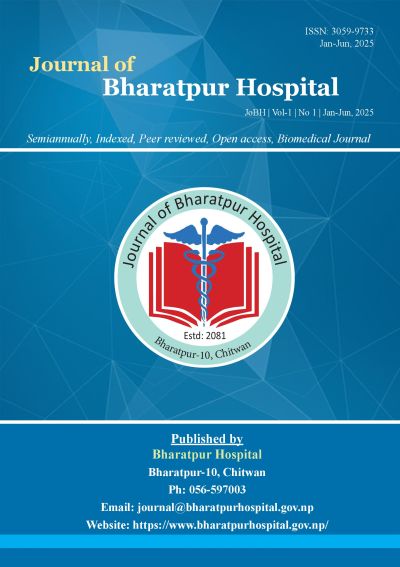Effectiveness of Structured Educational Program on Knowledge Regarding Newborn Care among Primi Mothers Attending in ANC OPD of Tertiary Hospital
DOI:
https://doi.org/10.3126/jobh.v1i1.78506Keywords:
Educational intervention, knowledge on new-born care, Primi-mothersAbstract
Background: Newborn care refers to the fundamental care provided to a newborn, including activities such as breastfeeding, maintaining body temperature, and taking precautions to prevent infections and injuries. The main objective of this study is to find the effectiveness of structured educational program on knowledge regarding newborn care among primi mothers attending in ANC OPD of tertiary hospital.
Methods: One group pre-test post-test design was used to assess the effectiveness of structured educational programmed regarding newborn care among primipara mother visiting the obstetric outpatient department of Bharatpur Hospital from August to December, 2024. A non-probability Convenient sampling technique was adopted and selected 60 samples. Interview guideline schedule with 30 items prepared and used for collecting data. Data analyzed in SPSS 20 version and interpreted using descriptive and inferential statistics.
Results: In pre-test 60% belonged to satisfactory knowledge where as in post-test sent percent were belongs to adequate knowledge. Knowledge on New born care was categorized into breast feeding, thermal protection and danger sign of new born. Overall mean score in all three components of newborn care was 21.75±2.68 in pre-test whereas 28.0±1.2 in the post test. The knowledge score after post test was increased in every aspect of domain and most difference found (p < 0.001) in Breast feeding score.
Conclusions: Primipara mothers' knowledge were increased after educational intervention. It was recommendation that Increasing the information and education regarding neonatal care for pregnant women especially primipara is required.
Downloads
Downloads
Published
How to Cite
Issue
Section
License
Copyright (c) 2025 The Author(s)

This work is licensed under a Creative Commons Attribution-NonCommercial-NoDerivatives 4.0 International License.
This license enables reusers to copy and distribute the material in any medium or format in unadapted form only, for noncommercial purposes only, and only so long as attribution is given to the creator.




